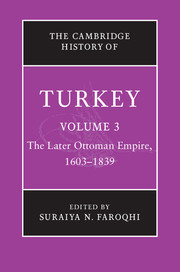Book contents
- Frontmatter
- PART I BACKGROUND
- PART II AN EMPIRE IN TRANSITION
- PART III THE CENTRE AND THE PROVINCES
- PART IV SOCIAL, RELIGIOUS AND POLITICAL GROUPS
- PART V MAKING A LIVING
- PART VI CULTURE AND THE ARTS
- 18 The Ottoman musical tradition
- 19 Arts and architecture
- 20 Ottoman literature
- Glossary
- Bibliography
- Index
- References
20 - Ottoman literature
from PART VI - CULTURE AND THE ARTS
Published online by Cambridge University Press: 28 March 2008
- Frontmatter
- PART I BACKGROUND
- PART II AN EMPIRE IN TRANSITION
- PART III THE CENTRE AND THE PROVINCES
- PART IV SOCIAL, RELIGIOUS AND POLITICAL GROUPS
- PART V MAKING A LIVING
- PART VI CULTURE AND THE ARTS
- 18 The Ottoman musical tradition
- 19 Arts and architecture
- 20 Ottoman literature
- Glossary
- Bibliography
- Index
- References
Summary
Introduction
Productive writers and poets were numerous during this period; and many texts, literary approaches, forms and genres could rightfully be discussed. However, due to limits of space, we will here present merely a small selection. As poetry was the literary expression par excellence in the Ottoman world, we will largely limit ourselves to poems. A contemporary Bosnian author by the name of Alâeddîn Sâbit (d. 1714) was much aware of the great popularity of poetry when he claimed that there was a poet under every paving stone. We will pay only passing attention to prose, as it was less practised as an art form, and has been little studied by present-day scholars. The task of the literary historian becomes even more difficult because the history and cultural history of this period are still very little known.
In comparison with both the 1500s and the 1800s the literature of the seventeenth and eighteenth centuries has been much neglected. It is generally assumed that the sixteenth century marks a high point in Ottoman literary life: at this time authors writing Turkish in both prose and verse stopped being simple imitators of their Iranian masters. As for the seventeenth century, we often read that apart from one or two gifted writers, the earlier level was not maintained. In the eighteenth century too we supposedly encounter a widespread dissolution or degeneration of the established literary forms, a process that announced the profound changes in mentality, form, genre and topic that were to characterise Ottoman literature in the nineteenth century.
- Type
- Chapter
- Information
- The Cambridge History of Turkey , pp. 481 - 520Publisher: Cambridge University PressPrint publication year: 2006
References
- 3
- Cited by



